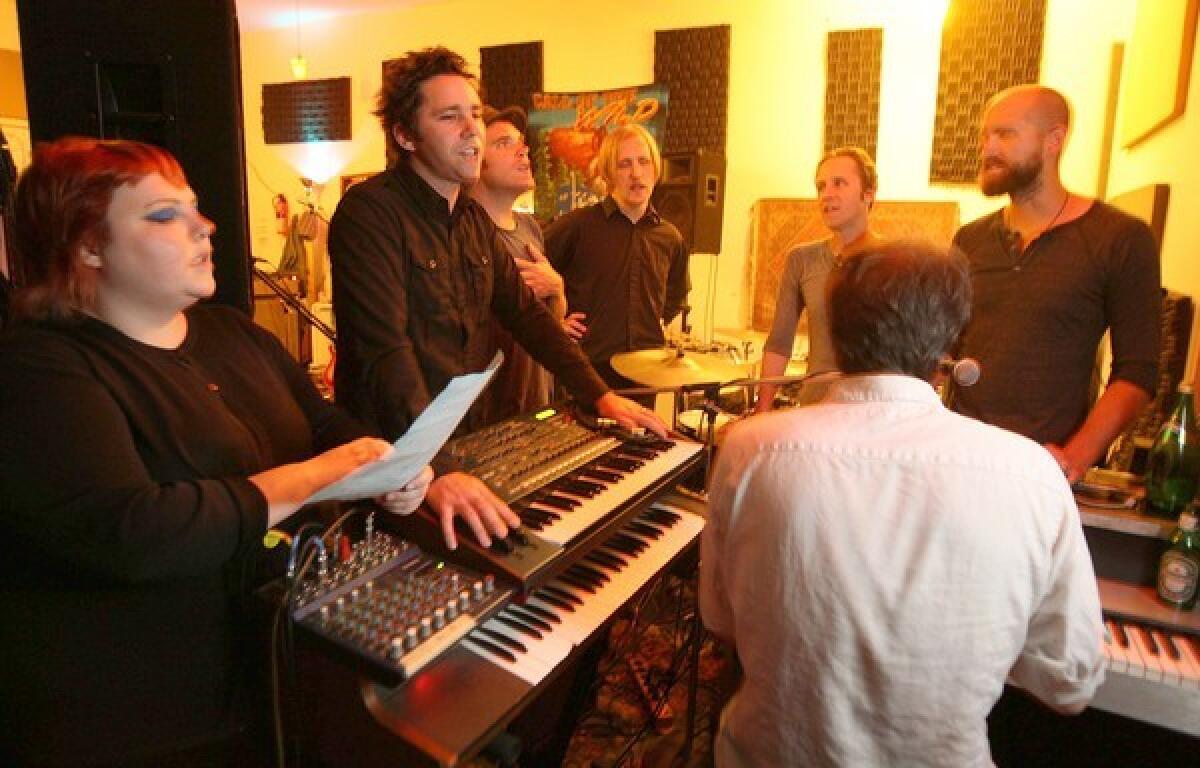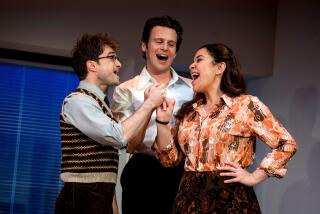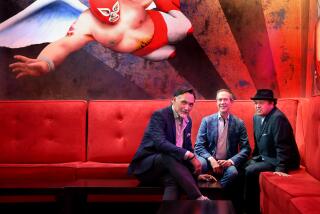The path to success is no longer labeled

One in a series of occasional articles
The Troubadour, awash on a recent night in indigo light and chiming guitars, doesn’t look all that different than it did in the 1970s, when music history plugged in to the club’s stage amps and earned the tiny West Hollywood venue the audacity to relentlessly advertise itself as “the world-famous Troubadour.”
The description still fits but, well, the world isn’t as big as it used to be, not for the recording industry or the young musicians who come to Los Angeles with dreams of gold and platinum. There’s an odd postwar feeling these days in some music-industry circles, a sense that the revolutionary front of the Digital Age knocked down all the familiar structures but forgot to build lasting new ones. At the same time, others see a ragged charm and wide-open opportunity in this new order.
The walls of the Troubadour’s front bar -- the spot where future Eagles members Don Henley and Glenn Frey met -- are lined with framed photos of the storied past. The fact that Elton John, Bruce Springsteen, James Taylor, Pearl Jam, Linda Ronstadt, the Byrds, Metallica and so many others came to the club for key early career successes isn’t lost on the new generation -- nor is the current situation of a recording industry that makes more money off its past than it does off its present.
“The path used to be clear -- you got a major-label deal, they got you on the radio, you toured and recorded albums,” said Steven Scott, guitarist and singer in an L.A. band called the Afternoons. “Now all that has changed, really, and the new path is . . . well, what is it? And where does it go?”
Scott and his band mates took the stage at the Troubadour on a Thursday night last fall with the mix of scruffy confidence and theatrical aloofness common to indie bands with local success but a desire for more. The crowd was good and the seven-member outfit was sharp; the musicians barely fit on the famously cramped stage, but their swooning, layered sound (which seems somehow simultaneously informed by Pink Floyd and the Mamas & the Papas) filled the room, and even the frosty L.A. hipsters in the back swayed their shoulders and bobbed their chins.
This is the sort of band that would have clawed for any chance to perform for a major-label A&R executive just a decade ago, but now its focus is on the Internet -- which, no surprise, is the prized high ground in the contemporary music business -- and finding spark and tinder wherever it may be.
The Afternoons have also sought out public radio, film soundtrack opportunities, the art scene and even designer T- shirts to promote their music in a time when “American Idol” and its lottery of fame have replaced the follow-the-chart career rules of “American Bandstand” and “American Top 40.”
“We don’t really think of the major labels as something we need or need to pursue at this point,” said drummer Brent Turner. “Everything these days is in flux, and you find your audience in different ways.”
The Afternoons became a bit of a local sensation when graphic artist Shepard Fairey took an interest in their music and, fresh from his Barack Obama “Hope” poster, designed street posters for the band’s first single, the buoyant “Say Yes.”
Fairey gave the band’s demo to an art collector with a considerable music pedigree -- Sex Pistols guitarist Steve Jones. Jones played the band on his radio show on Indie 103.1 (the now-defunct cutting-edge rock station), which was low in signal strength but high in tastemaker pulse.
Now the Afternoons are part of a group of young music acts participating in a new-model approach to the marketplace that may be quirky but is showing promise. “Art, fashion, live performance are the things that help us connect now,” Scott said. “We think if people hear the music and what we have to say, then we can start a relationship with them. But the hard part is getting heard.”
Rock is a hard place
The Afternoons have been in the throes of an identity crisis -- or maybe it’s more precisely described as a recognition crisis. “There’s a battle we need to win now,” Scott said during a band meeting late last year, “which is this Google battle against this Welsh band also called the Afternoons.”
In the “old” days, if two bands on opposite sides of the Atlantic had the same name, it wouldn’t become an issue until one of them reached some international commercial plateau. Now, though, the globe is wired, and a group in Athens, Ga., and one in Athens, Greece, are only a mouse click apart.
“What if someone goes to Amazon,” Turner asked grimly, “and they put in our name. Do they get us or these other guys?”
YouTube, Facebook, Twitter and MySpace are the places where bands lay circuitry for success these days. Websites are as key to success today as radio was to the hit acts of the 1950s, said David “Beno” Benveniste, the manager of such bands as System of a Down and Alice in Chains, which is up for a Grammy tonight.
“Giant bands can influence millions of people through their site, and baby bands can build a scene from nothing through a cool site,” said Benveniste, who also founded StreetWise.com, a tastemaker website that has hired out its services to Coca-Cola, EA Games and Live Nation. “Whether it be showcasing music, setting up a record or tour, access or simply updates on a band’s current action, a website to a band is like a storefront to a retailer. Without a site, you are out of sight.”
Radio, meanwhile, is a tricky proposition. Mainstream commercial radio is no longer a regional business with a large number of idiosyncratic gatekeepers; the business is now fully in a national corporate mode and ruled by market testing and the heavy rotation of the same safe hit songs. Audiences are still vast, but the number of artists they hear is startlingly low.
Jeff Pollack, a longtime music consultant who also works with MTV and VH1, said television is the fastest way to music success these days, but that’s a forum more interested in pop singers than guitar heroes.
“Against the backdrop of an ‘Idol’-dominated landscape, a young rock band has a much harder time getting exposure today than a pop or even country artist,” Pollack said. “There is virtually no rock played on Top 40 radio . . . and there are even fewer contemporary rock stations than just a few years ago. New rock bands need to rely on continual touring, social media and music sites to expose their music.”
The members of the Afternoons know the numbers. If you look at the bestselling music CDs of the last decade, the list is dominated by rappers, pop acts and country singers. About a third of the top 20 acts of the decade were the hat-and-boots crowd, perhaps because their audience hasn’t walked away from the CD format as quickly as fans of other genres.
There were three bands among the bestselling 10 artists for the decade. The Beatles, who broke up in 1970, finished second. At No. 7 was L.A.’s hip-hop-informed Linkin Park and at No. 9 was Creed, a Florida group that was consistently savaged by critics as derivative and disposable. Taken together, that is not exactly a shining light of inspiration for young people to pick up their first Stratocaster.
The big picture
Flea, the bass player with the Red Hot Chili Peppers, one of the most successful L.A. bands ever, said the old daydreams of rock are outdated: “When I was young, it was about the magical record-label guy who tapped you on the shoulder and suddenly you’re playing the Forum, riding around in a limo, getting that shiny tour bus. All of that doesn’t exist anymore.”
In a way, Flea said, the new scaled-down expectations may end up being better for the purity of the art even though they may limit the audience. He also said it may be the best time to be a music fan, with the technology that makes any and all music instantly accessible. For artists, of course, that deluge makes it hard to stand out.
Some artists -- including the pop group the Black Eyed Peas, nominated for six Grammys tonight -- have responded by embracing corporate sponsorship deals and relentless television appearances to achieve stardom through the persistence of their image across media.
The Afternoons want to be part of a bold future, but they also look back on the past with a sense that they missed out on something. This is the age of the single, thanks to the download marketplace and the intense emphasis on placing songs on soundtracks and in commercials. But the Afternoons long for the album era, when the Beatles, the Who or Springsteen would deliver artistic statements spread across two sides of vinyl and held together by theme, texture or storytelling.
The modern market wants to be a jukebox, but Scott said his band has a long-play spirit. “We make albums, and there are still bands that approach it that way, like Radiohead and the Flaming Lips, but there are a lot fewer of them.”
But the album matters, Afternoons member Brian Canning said: “If you’re a band with one song and it comes out, it goes in some Volvo commercial and it goes on people’s iPods, but then that’s it -- that’s not really what we want. We want a relationship between the music and the fans. I grew up in Marin County, and the Grateful Dead are just part of life there. If you were a Dead fan, you didn’t want a copy of the studio albums. That band was about their concerts and the bootlegs and the culture.”
A folk experiment
The Afternoons began in 2006 as a folk experiment by Canning and Scott, who were in a band called Irving that had made a few music videos and become known for crisp live shows in the first half of the decade. The name of the new band was a reference to the fact that the breezy sessions were in the afternoon before the pair got to their “day job” of playing in Irving at night.
Tom Biller, a Grammy-winning recording engineer, sat in as bassist and producer. The group took on a new sound when Claire McKeown added her opera-trained voice to the mix, giving the group a touch of the Mamas & the Papas in terms of harmony and sonic coloring. Turner, the roommate of Canning and Scott, came over from Irving, as did Aaron Burrows and Sam Johnson, who filled out the lineup.
It was a story of alliance and exploration that happens constantly in the churn of the L.A. scene.
Sometimes it results in magic, as when the members of Kara’s Flowers rejiggered their sound, dubbed themselves Maroon 5 and became a platinum-selling, award-winning pop group. Or when the Silversun Pickups, up for a Grammy award tonight as best new artist, rose up out of the Silver Lake scene after years of jockeying for position with peers who now watch with a mixture of envy and inspiration.
The Afternoons hope their story has the right blend of serendipity and stage-sweat labor. Early last year they got a residency at Spaceland, a hot club for rising acts, and their live shows, like the one at the Troubadour, have drawn solid attendance by fans who know the music -- always a good sign.
In spring 2008, Fairey designed a poster (a striking black, white and red close-up of the jawline of a man shouting “Say Yes”) that sprinkled a bit of magic dust on the band.
Fairey also put the music in the hands of Mark Sovel, a key figure at Indie 103.1 who worked closely with Jones, the guitarist, DJ and Rock & Roll Hall of Fame inductee.
The band is also part of a novel approach to music marketing called Music Tees, a New York-based venture that puts band art on the front of high-end T-shirts and a track listing on the back. The $40 shirts come with a code to download the band’s music; other acts involved in the venture include Mos Def, David Gray, Third Eye Blind, Regina Spektor and Devendra Banhart, and a recent contract with Warner Bros. suggests that the apparel approach to a hardscrabble music market is gaining some traction.
It’s a topsy-turvy concept. It was music that used to sell T-shirts at arena shows; now a T-shirt can be the commodity, with music as the hopeful passenger in the transaction.
The Afternoons say their approach to their career is all about “team-building,” a term that the punk heroes of the Clash probably never uttered.
This is a different era, though. Their focus now is looking for opportunities to “create a mystique” for the band through its website and music releases, holding fast to the concept of the album and finding a way to place their music in films.
Above all, the Afternoons want to continue sharpening their live-music skills.
“There are so many people in this town who get some success but really aren’t very good live,” Scott said. “It’s one thing to get popular; it’s another to be popular and good.”
The band chipped in on a Highland Park studio for Biller in exchange for a month of session time. (When construction fell behind, the band finished the drywall and insulation.) The musicians recorded a six-song EP with long, wispy tracks that bleed into each other and defy the download imperatives of today; they also plan to film a trilogy of music videos.
In March, the band will travel to Texas for the South by Southwest festival, the massive Austin gathering for unsigned bands. Do they want a record-label deal? They are unsure how to answer that question.
Tough decisions abound for a band on the edge of the spotlight in a city that defines the music industry.
Just last week the musicians made the final decision that when they trek to Texas, they will do so with a new name. The band members didn’t come to the choice lightly and they fret about losing all the name recognition they’ve built up or perhaps confusing fans. But, with high hopes, they are renaming themselves Shadow Shadow Shade. The reason? Here in 2010, the only a chance a band has is to remember its audience. “And for us,” Turner said, “that’s whoever is doing a Google search.”
More to Read
The biggest entertainment stories
Get our big stories about Hollywood, film, television, music, arts, culture and more right in your inbox as soon as they publish.
You may occasionally receive promotional content from the Los Angeles Times.






